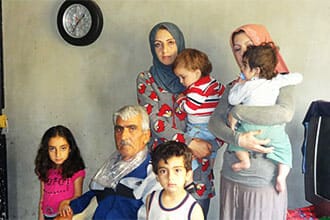News > Blog
Finding Safety in Lebanon – Halima’s Story
Published 06/11/2015 by Global Communities

Finding Safety in Lebanon – Halima’s Story
“We are finally able to sleep at night with peace of mind, not worrying about our children’s lives.”
Halima and eleven family members fled Ghouta, Syria for Lebanon when the ongoing civil war became too much for them to bear. The family settled in Mghayreyyeh – a small village in Mt. Lebanon located an hour outside of Beirut.
They spent the first three days camped under a large tree while they searched for a more permanent place to live. Refugee camps are illegal in Lebanon so Syrians rely on apartments, community centers, and Lebanese families for places to live. The steady influx of refugees over the past four years means that all three options are in high demand. For Halima and her family, the best they could find was an abandoned shed that no walls, running water or bathroom at a nearby chicken farm.
For the next year, the adults would stay awake during the night to protect the children from animals and rodents while they slept and their only water source was from a stream that also contained waste water from the farm.
In 2015, Halima’s family was referred to the Global Communities’ Shelter Assistance for Refugees program. Through the program, Global Communities rehabilitates unfurnished houses if the owner agrees to let a refugee family live in the home rent-free for one year. For Halima it meant moving into a house with three bedrooms, a sitting room, a kitchen and a bathroom. “We’re safe now, thanks to Global Communities,” Halima said. “We are finally able to sleep at night with peace of mind, not worrying about our children’s lives.”
Read more stories about refugee families and diplaced communities as they rebuild their lives.
How can you help?Donate today. Your donation gives them hope. Through your support, we are able to meet the needs of the most vulnerable refugees and help them create a more stable life.
Want to know more?Learn how we are helping internally displaced Syrians, refugees and host communities in Syrian, Lebanon, and Jordan.
